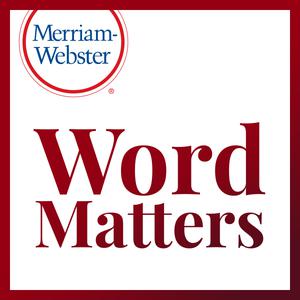
Word Matters
Merriam-Webster
Word Matters is a show for readers, writers, and anyone who's curious about the English language. Join Merriam-Webster editors as they challenge supposed grammar rules, reveal the surprising origins behind words, tackle common questions, and generally geek out about the beautiful nightmare that is our language.
- 22 minutes 8 secondsEpisode 100: How did we get here?
It’s our 100th episode, which seemed like a good occasion to answer a listener question of a more personal type: how did we—that is, we three editors—get here?
Hosted by Emily Brewster, Ammon Shea, and Peter Sokolowski.
Produced in collaboration with New England Public Media.
Transcript available here.
See Privacy Policy at https://art19.com/privacy and California Privacy Notice at https://art19.com/privacy#do-not-sell-my-info.
3 August 2022, 4:00 am - 13 minutes 48 secondsDo we repeat ourselves? Very well then, we repeat ourselves.
A listener questions a tautology in one of our definitions and starts us off on a discussion of all types of repetition and redundancy.
Hosted by Emily Brewster, Ammon Shea, and Peter Sokolowski.
Produced in collaboration with New England Public Media.
Transcript available here.
See Privacy Policy at https://art19.com/privacy and California Privacy Notice at https://art19.com/privacy#do-not-sell-my-info.
27 July 2022, 4:00 am - 14 minutes 55 secondsHackneyed Phrases, Both Old and New
Writing advice often includes hackneyed phrases we’re supposed to avoid. The phrases we're warned against today are different from the ones of yesteryear. We'll explore both.
Hosted by Emily Brewster, Ammon Shea, and Peter Sokolowski.
Produced in collaboration with New England Public Media.
Transcript available here.
See Privacy Policy at https://art19.com/privacy and California Privacy Notice at https://art19.com/privacy#do-not-sell-my-info.
20 July 2022, 4:00 am - 21 minutes 20 secondsTips for Frenchifying Your French
Whether you're hoping to improve your high school French or just order that croissant with more confidence, we have some tips for you.
Hosted by Emily Brewster, Ammon Shea, and Peter Sokolowski.
Produced in collaboration with New England Public Media.
Transcript available here.
See Privacy Policy at https://art19.com/privacy and California Privacy Notice at https://art19.com/privacy#do-not-sell-my-info.
13 July 2022, 4:00 am - 27 minutes 25 secondsEggcorns, Mondegreens, and Spoonerisms—Oh My!
A discussion of various kinds of slips of the tongue and errors of the ear.
Hosted by Emily Brewster, Ammon Shea, and Peter Sokolowski.
Produced in collaboration with New England Public Media.
Transcript available here.
See Privacy Policy at https://art19.com/privacy and California Privacy Notice at https://art19.com/privacy#do-not-sell-my-info.
6 July 2022, 4:00 am - 18 minutes 50 secondsTraveling Words: Luggage, Baggage, and the Recombobulation Station
In the disconcerting event that your travels by air deliver you, but not what you've packed, to your destination, you may find yourself filing a lost luggage claim, or a lost baggage claim—it could be either. Instead of ruminating over the awful circumstances, we turn our attention to the words themselves; we also revisit the recombobulation area we first discussed in episode 86.
Hosted by Emily Brewster, Ammon Shea, and Peter Sokolowski.
Produced in collaboration with New England Public Media.
Transcript available here.
See Privacy Policy at https://art19.com/privacy and California Privacy Notice at https://art19.com/privacy#do-not-sell-my-info.
29 June 2022, 4:00 am - 20 minutes 35 secondsSkunked Words
Sometimes a word, over time, will take on a meaning that doesn’t play very nicely with its original meaning, leaving a person who knows both meanings unsure what to do. Is the word still usable? Or is it … skunked?
Hosted by Emily Brewster, Ammon Shea, and Peter Sokolowski.
Produced in collaboration with New England Public Media.
Transcript available here.
See Privacy Policy at https://art19.com/privacy and California Privacy Notice at https://art19.com/privacy#do-not-sell-my-info.
22 June 2022, 4:00 am - 25 minutes 38 secondsWhen Dictionaries Drop Words
We’ve discussed how words come to be entered in our dictionaries before, but today we’re going to talk about removing words from dictionaries. Which words get dropped? And why?
Hosted by Emily Brewster, Ammon Shea, and Peter Sokolowski.
Produced in collaboration with New England Public Media.
Transcript here.
See Privacy Policy at https://art19.com/privacy and California Privacy Notice at https://art19.com/privacy#do-not-sell-my-info.
15 June 2022, 4:00 am - 17 minutes 39 secondsWordle Does Not Make Us Nauseous
Some listeners want to know if working with words professionally makes a dictionary editor better, or worse, at Wordle, and another listener wants us to weigh in on the difference between 'nauseated' and 'nauseous'—which doesn’t turn our stomachs in the least.
Hosted by Emily Brewster, Ammon Shea, and Peter Sokolowski.
Produced in collaboration with New England Public Media.
Transcript available here.
See Privacy Policy at https://art19.com/privacy and California Privacy Notice at https://art19.com/privacy#do-not-sell-my-info.
8 June 2022, 4:00 am - 33 minutes 40 secondsThe Invention of the Modern Dictionary
The earliest dictionaries were the fruit of one person’s labor, but the 1864 Webster's Unabridged changed all of that.
Hosted by Emily Brewster, Ammon Shea, and Peter Sokolowski.
Produced in collaboration with New England Public Media.
Transcript available here.
See Privacy Policy at https://art19.com/privacy and California Privacy Notice at https://art19.com/privacy#do-not-sell-my-info.
1 June 2022, 4:00 am - 27 minutes 55 secondsAn Interview with Jacques Bailly, Official Pronouncer for Scripps National Spelling Bee
Jacques Bailly has been the official pronouncer for Scripps National Spelling Bee since 2003—23 years after winning the bee himself. A professor in the Classics department at the University of Vermont, his language expertise is vast, and talking to him is a delight.
Hosted by Emily Brewster, Ammon Shea, and Peter Sokolowski.
Produced in collaboration with New England Public Media.
Transcript available here.
See Privacy Policy at https://art19.com/privacy and California Privacy Notice at https://art19.com/privacy#do-not-sell-my-info.
25 May 2022, 4:00 am - More Episodes? Get the App
Your feedback is valuable to us. Should you encounter any bugs, glitches, lack of functionality or other problems, please email us on [email protected] or join Moon.FM Telegram Group where you can talk directly to the dev team who are happy to answer any queries.
 Lingthusiasm - A podcast that's enthusiastic about linguistics
Lingthusiasm - A podcast that's enthusiastic about linguistics
 A Way with Words - language, linguistics, and callers from all over
A Way with Words - language, linguistics, and callers from all over
 Lexicon Valley from Booksmart Studios
Lexicon Valley from Booksmart Studios
 Merriam-Webster's Word of the Day
Merriam-Webster's Word of the Day
 Grammar Girl Quick and Dirty Tips for Better Writing
Grammar Girl Quick and Dirty Tips for Better Writing
 Slate Debates
Slate Debates